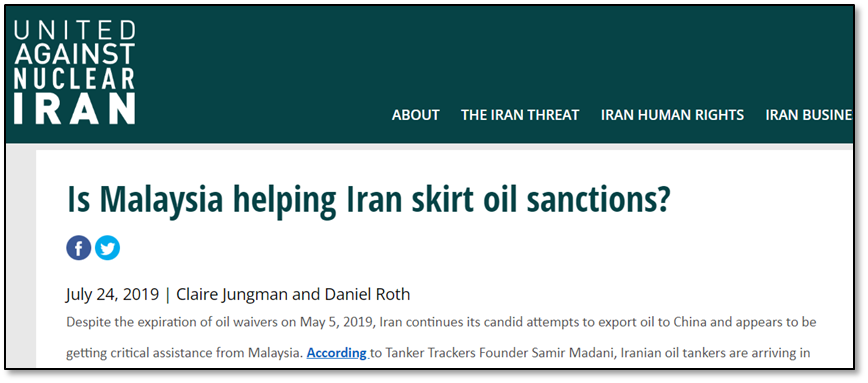September 2023 Iran Tanker Tracker
“Is Malaysia helping Iran skirt oil sanctions?” this blog asked in July 2019. Four years and a billion barrels of oil later, the Guardian has asked the same, highlighting striking discrepancies noted in UANI data between official records from China and Malaysia:
It was November 2022 and Chinese imports of Malaysian oil had reached a record high of more than one million barrels a day. The problem? Malaysia’s total national oil production was just 521,000 barrels a day, almost half of the amount China claimed it was importing.

In 2023, as in 2019, it is obvious that Kuala Lumpur has tolerated, if not actively facilitated, hundreds of illicit ship-to-ship transfers and re-brandings of Iranian-origin oil. Despite assurances from Marine Department Malaysia to the Guardian about efforts to “curb such activities,” the situation remains alarming with no signs of improvement. One week ago, UANI wrote for a second time to the same department, urging Malaysia to rescind flagging of an Iranian oil-carrying vessel, to thus far no effect.
“Iran continues its candid attempt to export oil to China and appears to be getting critical assistance from Malaysia,” we wrote four years ago. Clearly, nothing has changed in this respect - in all likelihood, it has only worsened. The summer months saw Iranian exports hit new five-year record highs, which could only happen with Malaysian accommodation.
The U.S. State Department acknowledges close cooperation with Malaysia in enhancing ‘Maritime Domain Awareness’ (MDA), a term and strategy formulated two decades ago during the George W. Bush presidency. MDA aims to meticulously monitor and enhance understanding of global maritime activities that could potentially threaten “the security, safety, economy, or environment of the United States.” Given that Malaysian waters serve as significant transit points for the Iran-China oil trade, this should trigger serious MDA concerns.
But just like its “quiet diplomacy” approach to China, the U.S. is letting Malaysia off the hook.
Iran's oil exports for September 2023 are shown below:
|
Country of Destination |
September 2023 - Barrels Per Day (bpd)* |
August 2023 - Barrels Per Day (bpd)* |
July 2023 - Barrels Per Day (bpd)* |
|
China |
1,292,351 |
1,716,892 |
1,288,633 |
|
Syria |
82,283 |
124,038 |
105,537 |
|
UAE |
62,319 |
56,057 |
37,972 |
|
Unknown |
109,960 |
35,585 |
32,258 |
|
Total |
1,546,913 |
1,932,572 |
1,463,176 |
* Figures to be updated over the following weeks
Malaysia and the SUEZ RAJAN
Malaysia was also an important pit-stop for the vessel SUEZ RAJAN, whose illicit transportation of Iranian oil was formally disclosed by the U.S. Department of Justice last month in its unsealing of the Statement of Offense. The Statement highlights especially how the Iranian oil was disguised in an attempt to avoid detection. Ultimately, however, its oil was seized by the U.S. and offloaded in Texas earlier this month, after UANI had first alerted authorities in February 2022.
The SUEZ RAJAN conducted ship-to-ship (STS) transfers at Tanjung Pelepas Port in Malaysia with the CS BRILLIANCE. The SUEZ RAJAN's logbooks and documentation were deliberately manipulated to misrepresent the volume of oil loaded from the CS BRILLIANCE onto the SUEZ RAJAN. The Statement further highlights that multiple operations were planned with vessels like the CS BRILLIANCE and another unnamed vessel.

Malaysia was also likely the location where additional illicit activities, like the deliberate conveyance of misinformation and documentation falsification, occurred.
The Malaysian authorities did not intervene nor question the discrepancies in the reported volumes and actual volumes of oil being transferred, highlighting a lack of oversight and regulation enforcement.
Falsification of official records and documentation is a serious violation of maritime law. The documented operations within Malaysian waters indicate that these illegal practices were not identified, prevented, or addressed by relevant Malaysian authorities.
While there is scant direct evidence of the Malaysian government’s involvement or endorsement of these activities, the events occurring in Malaysian waters highlight significant gaps in regulatory oversight, compliance enforcement, and intervention against suspicious maritime activities. These gaps create an environment where illegal and sanction-evading activities can occur, undermining international efforts to enforce sanctions and regulate the global oil trade. For responsible and compliant participation in international trade and maritime operations, it is imperative for Malaysia to address and rectify these oversight gaps promptly.
Receive Iran News in Your Inbox.
Eye on Iran is a news summary from United Against Nuclear Iran (UANI), a section 501(c)(3) organization. Eye on Iran is available to subscribers on a daily basis or weekly basis.